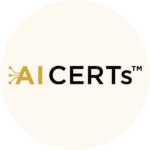
AI CERTS
5 months ago
AI Classroom Management Certification: Revolutionizing Education Management
In today’s dynamic educational landscape, effective classroom management is critical for fostering a productive and engaging learning environment. With the advent of Artificial Intelligence (AI), managing classrooms has transcended traditional methods, introducing innovative solutions that empower educators and enhance student outcomes. The AI Classroom Management Certification equips educators and administrators with the skills to leverage AI tools for improved classroom dynamics, streamlined administrative tasks, and personalized learning experiences.
This article explores the significance of AI in classroom management, the key components of an AI Classroom Management Certification, real-world applications, emerging trends, and actionable steps for educators looking to advance their skills in AI-driven education management.

Why AI Classroom Management Matters
The traditional methods of classroom management, though effective for decades, often lack the efficiency and adaptability required in today’s fast-paced educational systems. AI-powered tools address these limitations by automating repetitive tasks, analyzing student behavior, and providing actionable insights to educators.
Efficiency Through Automation
AI automates tasks like attendance tracking, performance assessment, and scheduling, allowing teachers to focus more on teaching and less on administrative work.
- Example: Automated attendance systems using facial recognition save hours of manual work.
Personalized Student Engagement
By analyzing data on student performance and behavior, AI tools create personalized learning paths, ensuring each student receives the attention they need.
- Example: Adaptive learning platforms tailor lessons based on individual student progress.
Behavioral Insights
AI systems monitor classroom activities, identifying patterns and providing insights into student engagement and participation. This helps educators intervene effectively when needed.
Related Reading: Learn more about AI’s role in education at EdTech Magazine.
What is an AI Classroom Management Certification?
An AI Classroom Management Certification is a specialized program designed to equip educators with the knowledge and tools to integrate AI technologies into their teaching and administrative practices.
Comprehensive Curriculum
The certification covers topics such as:
- Understanding AI in Education
- Basics of AI technologies and their applications in classroom management.
- Exploring AI tools like Edmodo, Classcraft, and Kahoot.
- Behavior Analytics and Student Engagement
- Analyzing behavioral patterns using AI tools to enhance classroom participation.
- Identifying students needing additional support through AI-driven insights.
- AI-Powered Administrative Solutions
- Automating attendance, scheduling, and report generation.
- Ensuring seamless communication between educators, students, and parents.
- Ethical AI Practices
- Understanding data privacy and security regulations, such as GDPR and COPPA.
- Addressing biases in AI algorithms to ensure fairness.
- Practical Applications
- Hands-on experience with AI-powered classroom management tools.
- Real-world case studies demonstrating successful AI integration in schools.
Skills Covered in an AI Classroom Management Certification
An AI classroom management certification provides educators with practical knowledge to integrate AI tools into their teaching strategies. Key skills include:
1. Understanding AI Technologies
Educators learn the fundamentals of AI, including machine learning and natural language processing (NLP), as they apply to classroom management.
2. Using AI-Powered Tools
Participants gain hands-on experience with tools like Classcraft, Google Classroom, and Edmodo, which enhance collaboration, grading, and feedback.
3. Data Analysis for Student Performance
AI systems collect and analyze student data, enabling educators to identify trends, address challenges, and measure learning outcomes.
4. Behavioral Analytics
Certification programs teach educators to interpret behavioral data, allowing for timely interventions to improve student engagement and performance.
5. Ethics and Privacy in AI
Educators learn best practices for ensuring student data privacy and maintaining ethical standards in AI use.
Real-World Applications of AI Classroom Management
1. Streamlined Administrative Tasks
AI automates time-consuming administrative activities, such as grading assignments, creating timetables, and tracking attendance.
- Example: Tools like PowerSchool and Edmodo integrate AI to provide real-time updates on classroom activities.
2. Enhanced Behavioral Monitoring
AI systems detect behavioral patterns in classrooms, enabling teachers to address disruptions proactively.
- Example: Sentiment analysis tools gauge student emotions, helping educators foster a positive learning atmosphere.
3. Personalized Learning Experiences
AI tailors lessons to individual student needs, improving engagement and learning outcomes.
- Example: Adaptive learning platforms like DreamBox personalize math lessons based on student strengths and weaknesses.
4. Seamless Communication
AI-powered chatbots facilitate communication between teachers, students, and parents by answering common queries and sharing updates instantly.
External Resource: Discover AI’s impact on education management at Forbes Education Insights.
Related Reading: For insights into AI’s impact on personalized education, visit World Economic Forum’s New WEF report shows how AI could transform education
Benefits of AI Classroom Management Certification
Earning an AI classroom management certification offers significant benefits for educators and institutions:
1. Enhanced Teaching Efficiency
AI automates repetitive tasks, allowing teachers to focus more on teaching and student mentorship.
2. Improved Student Outcomes
By leveraging AI analytics, educators can address individual learning needs, improving overall student performance and engagement.
3. Career Advancement
As AI adoption grows in education, certified professionals are more likely to secure leadership roles and opportunities in innovative learning environments.
4. Future-Ready Classrooms
Institutions that adopt AI tools are better equipped to handle modern educational challenges, including hybrid and online learning models.
External Resource: Learn how AI is shaping the future of education in McKinsey’s report on education technology.

Challenges in AI Classroom Management
1. Data Privacy Concerns
Handling sensitive student information requires strict compliance with privacy regulations.
2. Resistance to Change
Educators and administrators may resist adopting AI technologies due to unfamiliarity or fear of job displacement.
3. Cost of Implementation
Integrating AI tools into classrooms requires significant financial investment, particularly for underfunded schools.
Solution: Certifications like the AI Classroom Management Certification equip educators with strategies to address these challenges effectively.
Related Reading: For ethical guidelines in AI use, see UNESCO’s blog on Artificial intelligence and the Futures of Learning
Emerging Trends in AI for Classroom Management
1. Explainable AI (XAI)
Transparency in AI decision-making is becoming a priority, ensuring teachers understand how systems arrive at conclusions.
2. AI and Gamification
Gamified learning tools powered by AI are transforming classrooms into engaging environments.
- Example: Classcraft uses AI to create interactive learning experiences.
3. Predictive Analytics
AI systems predict student performance trends, helping educators intervene early to improve outcomes.
The Future of AI in Classroom Management
As AI technology advances, its applications in education are expected to grow, enabling more intelligent and adaptive classroom environments. Emerging trends include:
- AI-Driven Emotional Analysis: AI tools will assess students’ emotional states, providing insights to improve engagement and learning outcomes.
- Gamification of Learning: AI will enhance gamified learning experiences, making education more interactive and fun.
- Predictive Analytics for Curriculum Design: AI systems will analyze student data to optimize curricula, ensuring they align with individual learning paths.
Educators who earn an AI classroom management certification will be well-positioned to lead these innovations, ensuring that classrooms are not just smart but also inclusive and effective.
Steps to Excel with an AI Classroom Management Certification
1. Enroll in a Reputed Program
Choose certifications from trusted institutions, such as those offered by AI CERTs.
We can also take AI+ Learning & Development™ and AI+ Educator™ certifications courses in reputed company like AICERTs. Use the coupon code NEWCOURSE25 to get 25% OFF on AI CERTS' certifications. Don't miss out on this limited-time offer! Visit this link to explore AI+ Learning & Development™ and AI+ Educator™ certifications and enroll today.
2. Build a Strong Foundation in AI Basics
Understand the fundamentals of AI, including algorithms and data analysis.
3. Gain Hands-On Experience
Practice using AI tools for classroom management, focusing on practical applications.
4. Stay Updated on Trends
Follow industry news and participate in webinars to keep pace with emerging AI technologies in education.
5. Focus on Ethical Practices
Ensure that your AI implementations prioritize student privacy and fairness.
The AI Classroom Management Certification empowers educators to revolutionize how they manage classrooms, engage students, and streamline administrative tasks. By mastering AI tools and ethical practices, educators can create a more inclusive, efficient, and effective learning environment.